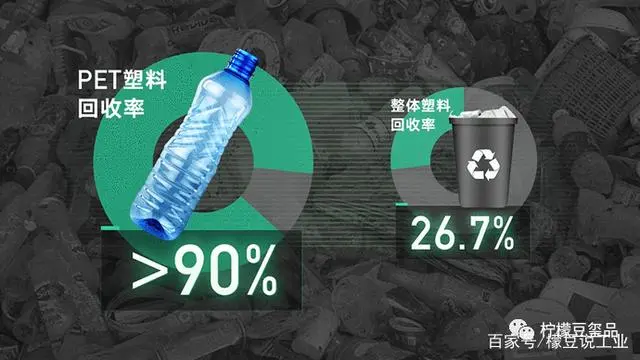We often use “plastic” to describe false emotions, perhaps because we think it is cheap, easy to consume and brings pollution. But you may not know that there is a kind of plastic with a recycling rate of over 90% in China. Recycled and recycled plastics continue to be used in various fields.
Wait, why plastic?
“Fake” plastic is an artificial product of industrial civilization. It is cheap and has good performance.
According to a 2019 report, the material cost per ton of beverage bottles made of No. 1 plastic PET resin is less than US$1,200, and the weight of each bottle can be less than 10 grams, making it lighter and more economical than aluminum cans of similar capacity.
How is plastic recycling achieved?
In 2019, China recycled 18.9 million tons of waste plastics, with a recycling value of more than 100 billion yuan. If they were all made into mineral water bottles, they would hold up to 945 billion liters of water. If each person drank 2 liters a day, it would be enough for the people of Shanghai to drink for 50 years.
To understand the nature of plastic, we must start with its production.
Plastic comes from fossil energy such as oil and natural gas. We extract hydrocarbons such as liquefied petroleum gas and naphtha, and through high-temperature cracking reactions, “break” their long molecular chains into short molecular structures, that is, ethylene, propylene, butylene, etc.
They are also called “monomers”. By polymerizing a series of identical ethylene monomers into polyethylene, we get a milk jug; by replacing part of the hydrogen with chlorine, we get PVC resin, which is denser and can be used as water and gas pipes.
The plastic with such a branched structure softens when heated and can be reshaped.
Ideally, used beverage bottles can be softened and reshaped into new beverage bottles. But reality is not that simple.
Plastics are easily contaminated during use and collection. Moreover, different plastics have different melting points, and random mixing will lead to a decrease in quality.
What solves these problems is modern sorting and cleaning technology.
After the waste plastics in our country are collected, broken and cleaned, they need to be sorted. Take optical sorting as an example. When searchlights and sensors distinguish plastics of different colors, they will send out signals to push them out and remove them.
After sorting, the plastic can enter a super purification process and pass through a vacuum or reaction chamber filled with inert gas. At high temperatures of around 220°C, impurities in the plastic can diffuse to the surface of the plastic and be peeled off.
Plastic recycling can already be done cleanly and safely.
In particular, PET plastic bottles, which are easy to collect and clean, have become one of the plastic types with the highest recycling rate.
In addition to closed-loop recycling, recycled PET can also be used in egg and fruit packaging boxes, as well as daily necessities such as bed sheets, clothing, storage boxes, and stationery.
Among them, B2P bottle pens from the BEGREEN series are included. B2P refers to bottle to pen. The shape of the imitation mineral water bottle reflects its “origin”: recycled PET plastic can also exert value in the right place.
Like the PET bottle pens, the BEGREEN series products are all made from recycled plastic. This BX-GR5 small green pen is made of 100% recycled plastic material. The pen body is made of recycled PC resin and the pen cap is made of recycled PP resin.
The replaceable inner core also extends the service life of plastic and helps reduce plastic waste.
Its pen tip has three grooves to support the pen ball, resulting in a smaller friction area and smoother writing with the pen ball.
As a professional pen-making brand, Baile not only brings a better writing experience, but also allows waste plastic to serve writers in a clean and safe way.
The recycled plastics industry still faces challenges due to complex production processes: its production costs are even higher than virgin plastics, and the production cycle is also longer. Baile’s B2P products are often out of stock for this reason.
However, producing recycled plastic results in lower energy consumption and carbon emissions than virgin plastic.
The significance of using recycled plastic to the earth’s ecology is far beyond what money can measure.
Post time: Oct-12-2023
